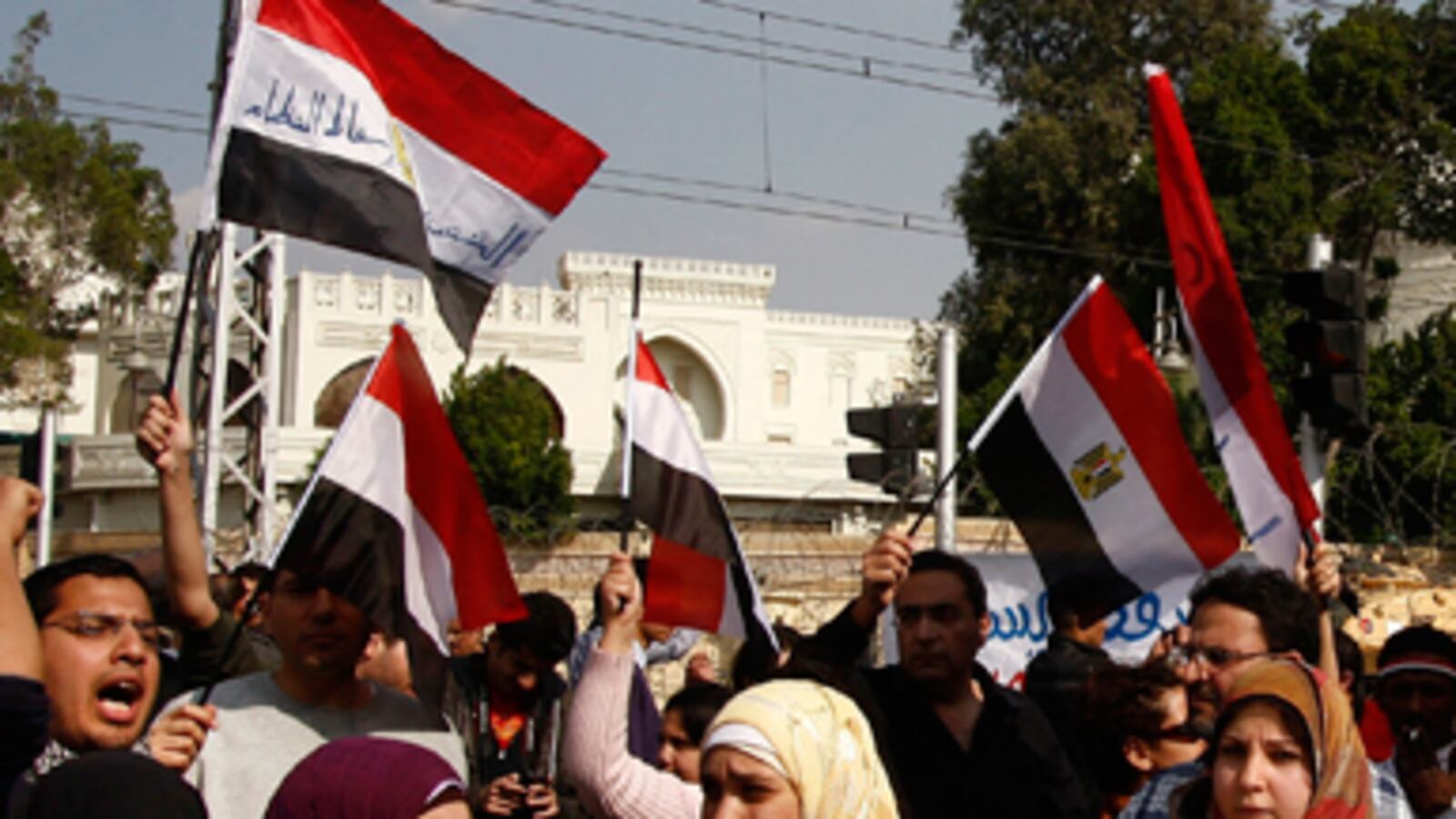As Egyptians celebrated Mubarak's fall into the wee hours Friday, the country's military chiefs released a statement pledging to allow "free and honest" elections and a "peaceful transition" of power. Babak Dehghanpisheh reports from Tahrir Square. Plus, our full coverage of the revolution.
A deafening roar went up from the crowd of thousands in Tahrir Square shortly after 6 p.m. local time when state TV confirmed the rumors: President Hosni Mubarak, the man who ruled the country with an iron fist for 30 years, had resigned. Groups of young men carrying Egyptian flags threw their arms around each other, jumping up and down and chanting, "Mubarak left, Egypt is free!" (which rhymes in Arabic). Others embraced and wept openly. One man looked at the scene around him—a swirl of flags and anti-regime banners—in disbelief, simply shaking his head. Within minutes, hundreds of devout Muslims lined up row after row across the square. This wasn't a designated prayer time: It was a prayer of thanks.
For one small group within that massive crowd, the moment was especially poignant. In the midst of a jumble of tents and plastic tarps, a group of young men and women had plotted revolution for the past two weeks. Two wireless networks—Revolution one and Revolution two—were set up in the tent city to keep them plugged in. And they camped out in a large green tent around the clock. Some were among the original group of 14 activists who had helped plan the first large protest on January 25th, others were ragtag group of bloggers and activists who had later joined the struggle.

All of them now are in shock. "We did it! We did it! We made a Facebook revolution!" shouted Ahmed Gohari, a 30-year-old activist with a scruffy beard and glasses who was shaking and crying with excitement. "People should be very proud of this. The new Egypt is here." Nearby, Ziyad Elaimy, a 30-year-old lawyer, hugged a friend as green and red fireworks burst over the square. Despite his youth, Elaimy, tall and stout with thick-framed glasses, has been an activist for many years and is now an assistant to Mohammed ElBaradei, the former International Atomic Energy Agency chief who's now a prominent political figure in Egypt. On Thursday, Elaimy had spoken at a press conference announcing a revolutionary council of sorts, teaming up activist youth with longtime opponents of the Mubarak regime. He knows the brutality of the regime firsthand: Elaimy was imprisoned several times and was beaten and tortured in jail. "I can't believe it's over," said Elaimy, choking up with emotion. "It's like I'm living in a dream."
“I can’t believe it’s over,” said Ziyad Elaimy, a 30-year-old assistant to Mohammed ElBaradei, choking up with emotion. “It’s like I’m living in a dream.”
After 30 years of persecution, devout Egyptians, particularly members of the Muslim Brotherhood, in the crowd were also overcome with emotion. Dozens of young men joined in circles near the Omar Makram mosque on the southern end of Tahrir Square, chanting "Allah Akbar." "I can now say I'm Muslim Brotherhood. I can use my real name," says Abdel Rahman Ayyash, a member of a Muslim Brotherhood youth group, with a beaming smile. "We are free. We really made it." Some Egyptian Christians fear Mubarak's departure will open the doors for a takeover by the Muslim Brotherhood, but others in the community say those concerns are misplaced. "The Muslim Brotherhood won't take over," says Sally Moore, 32, one of the prominent young revolutionaries and a member of the Coptic Christian community who sports a silver necklace of a fused cross and crescent. "This is a revolution of the people. It's a new phase for the Muslim Brotherhood as well."
Moore, a trained psychiatrist, hasn't slept much in the past 24 hours. After Mubarak's speech Thursday night, she stayed awake, anticipating a day of widespread violence. When the news of Mubarak's resignation came, she was shocked. Then she picked up the phone and called the "foes"—the naysayers who had doubted her and her colleagues' revolution. "They said, 'How can you set a date for a revolution?' Well it happened!" she says with a smile. "Tonight they said mabrouk [congratulations]." Moore says she's still worried about the role of the army, but for the moment it's time to celebrate.
A group of kids posing for pictures on a tank and hamming it up with soldiers nearby looked like they were doing exactly that. In the center of the square, a fire-breather performed for an ecstatic crowd. "We are going to miss Tahrir," Moore said, wistfully.
Babak Dehghanpisheh was named Newsweek's Baghdad bureau chief in December 2006. He has been covering Iraq regularly for the past five years.






